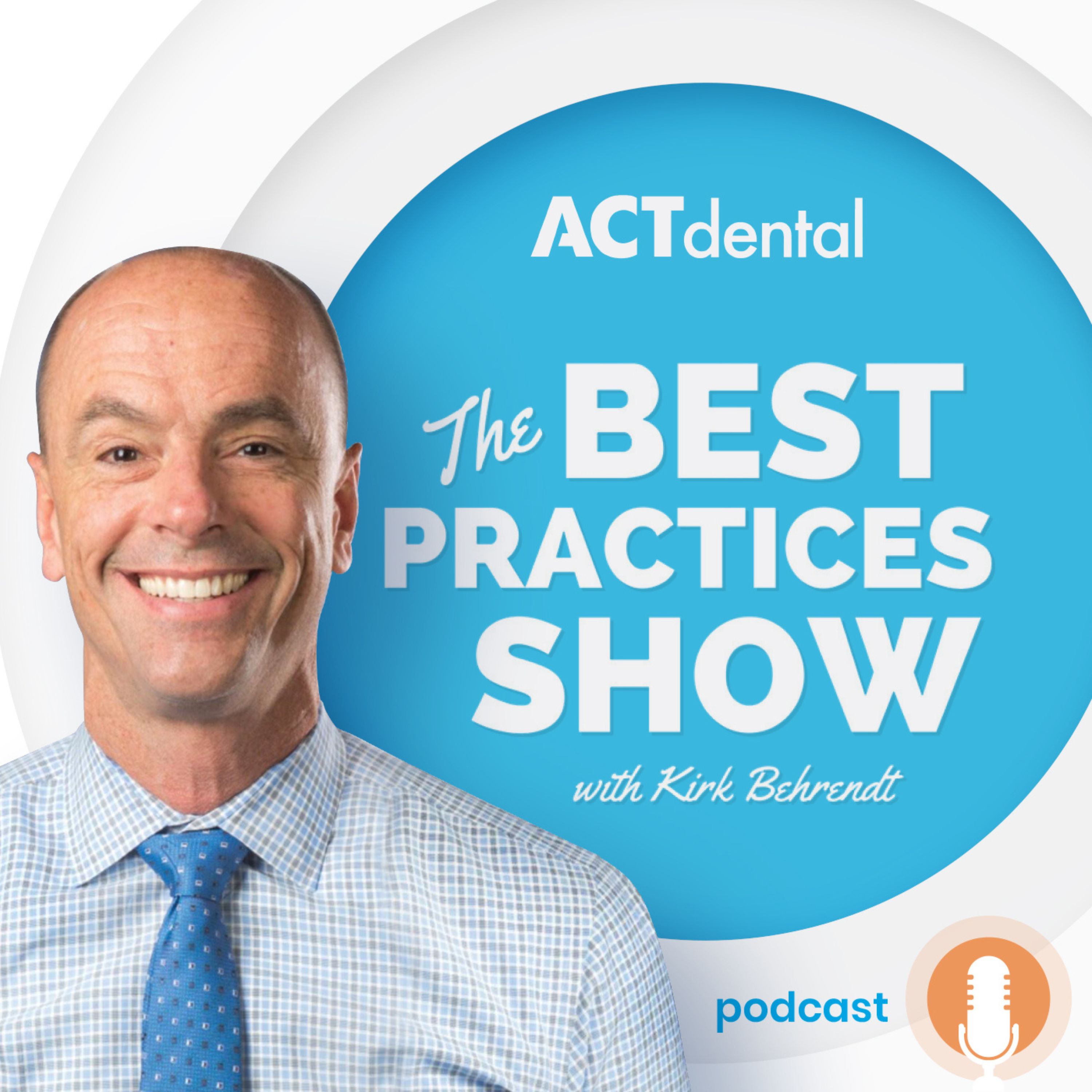Episode 327
327: Bridging the Gap Between Material Selection & Clinical Application - Dr. Taiseer Sulaiman
Bridging the Gap Between Material Selection & Clinical Application
Episode #327 with Dr. Taiseer Sulaiman
Imagine a dentist who doesn't know what they're putting into your mouth. They don't know the name or even the basic components of what they're using. Would you really want them restoring your teeth? To help you not be that clinician, Kirk Behrendt brings in Dr. Taiseer Sulaiman to teach you the importance of understanding the materials you work with. Close your gap between material selection and clinical application! If you want to optimize your restorative treatment, listen to Episode 329 of The Best Practices Show!
Main Takeaways:
Dental students are suffering from the gap between material selection and clinical application.
Students are graduating from dental school with minimal knowledge about materials.
No matter how talented you are, if you select the wrong material, it will not support your work.
Not knowing how to select and apply the right material can ruin your practice!
New materials have a lack of clinical trials and data.
Finding trusted sources of information for dental materials can be a challenge.
Offer gold restorations to patients before new materials. You know gold works!
Quotes:
“One of the challenges that we’re facing in dental education, before we get into the clinical world, is that if you look at the area of dental materials, usually, it is taught by material scientists — and I have the utmost respect for them. Without them, we wouldn't be able to do the things that we’re doing for our patients in our clinical practice. But many of the material scientists did not have the opportunity to try the things that they were researching and discovering on patients. And so, they were missing that link.” (05:15—05:50)
“To be in an area where you can understand the research world, where you can understand the development and be up to speed with the materials that are introduced into our profession, and to be able to evaluate that, to research that, and then take what's useful and apply it in the patient’s mouth or in a specific clinical scenario, that's when you really complete the circle. And so, that's where I think most of the dental schools are missing out on.” (05:51—06:18)
“Our students are really suffering, because if you think about dental materials that were taught in the ‘70s and ‘80s, there were about five or six materials that were out there, and that was it. And so, now, if you look at dental cements alone, there's like eight, nine different types of dental cements. I mean, you talk about the adhesive systems, you talk about ceramics, you talk about composites, impression, etc., you can go on and on, how do you teach this to dental students and when do you teach it to the dental students? So, that's been a challenge in the dental curriculum, which I hope — and I'm certain — that a lot of dental schools are focusing and looking at.” (07:21—08:01)
“You can be a talented, god-gifted clinician with hand skills and dexterity, but if you select the wrong material and you apply it incorrectly, does it really matter how talented you are or how well you prepared that tooth? That material is not going to support your work. Patients look for final outcomes, and they don't know how you isolated the tooth, how you prepared it, how wonderful your line angles and convergence and all that. They don't really care about that. They want a final restorative outcome that lasts for a long time.” (08:04—08:42)
“Something as simple as not knowing how to select the right material and not knowing how to apply it is a big problem because it will ruin your practice.” (08:44—08:54)
“The current curriculum right now, dental materials, is taught in the first year. [Students] don't even know what a cavity is. How can you teach them about adhesion and restoration of non-carious cervical lesions using composites? They don't even know what a non-carious cervical lesion is. So, that's the severity that we had. That's the gap that we currently have, and most dental schools have the same problem.” (09:19—09:41)
“If you select the right material [and] apply it correctly, even if you did not perform properly in your restorative procedure, that material might be able to save you — if you apply it correctly.” (10:26—10:37)
“It’s not just material selection and material application, it’s the thought process of, who do you listen to, where do you gain your information from, where do you tune in to get updates on, specifically in my area, in dental materials and restorative dentistry. Who do you trust? Social media and podcasts and all that, it can be very, very helpful. But at the same time, it can be harmful if it’s not monitored properly, or the misinformation and misguidance. We’ve seen it all the time. And so, it is challenging. And how do you direct someone who’s been out of practice one to five years to judge what is good and what is bad for them?” (14:25—15:06)
“The average graduate from a dental school has so much to take in versus the dental student graduating in the 1960s and ’70s and ‘80s. It is just a different world. And sometimes, I look at the students and I'm like, ‘Are we asking too much from them?’ I mean, it’s not just the materials; we’re talking about restorative dentistry where there are so many other specialties. And some general dentists do other specialties, whether it’s Invisalign and ortho, or simple endodontics, or simple surgeries and implants. And so, now, they have to put everything together and understand.” (15:12—15:49)
“It’s not acceptable to have a simple course on dental materials that's given in a non-clinically applicable fashion early on in [students’] first year. That's no longer acceptable or should be acceptable in any curriculum.” (19:15—19:31)
“Just zirconia alone is like four or five different types right now. And they're totally different in the way that they perform clinically. And so, how do you guide the clinician to understanding the different types and how to apply them? They're using them while I'm sharing with them this information! And so, I'd be lucky to get through to some of them and have them really understand, ‘Wait a minute. I've been using this, but I'm probably using the wrong one. If I've gotten away with it, that's fine. But it doesn't mean that I can still continue to get away with that.’” (26:16—26:43)
“Look at the materials that we used in the past. Offer your patient that gold restoration first because we know that works. These materials have passed the test of time. These [new] materials haven't. And as much as the advertisement, and some of the in vitro research, and key opinion leaders’ experience with it, okay, is there a five-year follow-up, a 10-year follow-up? We don't have that.” (27:07—27:33)
“We don't want to go back to the small list of materials available. But I think what's important right now, because of the lack of clinical trials, if you have a representative from a manufacturer knock on your door and come try to show and sell you specific items and products, you have to have the right questions in mind to ask them.” (33:56—-34:18)
“I've had clinicians that have been 10, 15 years in a practice, they're like, ‘Yeah, yeah. What's that cement? It’s the yellow and black.’ And I was like, ‘You're using it daily. You don't know what the name of it is?’ So, you're more of just a technician just technically applying it. You're a clinician. You have to add science and knowledge to this so that it becomes the whole picture and the whole circle.” (43:24—43:50)
Snippets:
Dr. Sulaiman’s background. (03:06—04:32)
Why this is an important topic in dentistry. (05:12—10:37)
Materials are a moving target. (11:14—17:34)
Awareness is a challenge in dental schools. (17:51—20:00)
There is a lack of clinical trials and data with new materials. (20:48—27:37)
The importance of preceptors. (28:21—31:52)
Materials in the future. (32:49—40:02)
Dr. Sulaiman’s dental education program. (41:07—49:19)
Dr. Sulaiman’s contact information. (49:36—50:27)
Reach Out to Dr. Sulaiman:
Dr. Sulaiman’s Facebook: https://www.facebook.com/dr.taiseer
@taiseersulaiman
Dr. Taiseer Sulaiman Bio:
Dr. Taiseer Sulaiman is an Assistant Professor and the Director of Biomaterials and Biomimetics in the Department of Operative Dentistry at the University of North Carolina, where he gained his clinical certificate in Operative Dentistry. He completed his PhD in Dental Materials from the Department of Prosthetic Dentistry and Biomaterial Sciences from the University of Turku in Finland, in collaboration with the Department of Operative Dentistry, University of North Carolina. Dr. Sulaiman is a clinician and a researcher hoping to bridge gaps between dental research and clinical application. Dr. Sulaiman’s research focus is on dental ceramics, adhesion, cements, and color and appearance in dentistry and biomimetics. He is a member of numerous academies, including the IADR/AADR, Academy of Operative Dentistry, the Society of Color and Appearance in Dentistry, and the American Dental Association.


